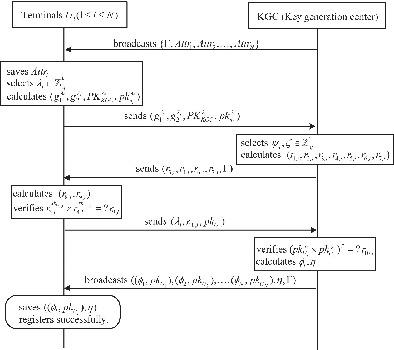当前位置:
X-MOL 学术
›
Trans. Emerg. Telecommun. Technol.
›
论文详情
Our official English website, www.x-mol.net, welcomes your
feedback! (Note: you will need to create a separate account there.)
An asymmetric group key agreement protocol based on attribute threshold for Internet of Things
Transactions on Emerging Telecommunications Technologies ( IF 2.5 ) Pub Date : 2020-11-25 , DOI: 10.1002/ett.4179 Yong Gan 1, 2 , Bingli Wang 1 , Yuan Zhuang 1 , Yuan Gao 3 , Zhigang Li 1 , Qikun Zhang 1
Transactions on Emerging Telecommunications Technologies ( IF 2.5 ) Pub Date : 2020-11-25 , DOI: 10.1002/ett.4179 Yong Gan 1, 2 , Bingli Wang 1 , Yuan Zhuang 1 , Yuan Gao 3 , Zhigang Li 1 , Qikun Zhang 1
Affiliation

|
With the development of wireless mobile network and Internet of Things (IoT), users enter the network with a large amount of data and information, including some important personal information, such as ID number, telephone number. Personal privacy disclosure has become one of the focuses of attention. In this article, we propose an asymmetric group key agreement (GKA) protocol based on attribute threshold for IoT to protect user privacy. Users do not need to expose any personal information in the group, but only need to meet the same number of attributes and conduct bidirectional authentication registration with key generation center (KGC) to ensure the legitimacy of mobile terminal members participating in GKA. In the registration phase, user performs heavy preliminary calculations according to the designed protocol, thereby reducing the computation in the key agreement phase and decreasing the complexity of the protocol. The protocol can realize self‐verification, and any member participating in key agreement can verify the correctness of the negotiated key by themselves. Under the assumption of bilinear computational Diffie‐Hellman problem, the security of the protocol is proved. Performance analysis further shows that our protocol has lower energy consumption in terms of communication and computing.
中文翻译:

基于属性阈值的物联网非对称组密钥协商协议
随着无线移动网络和物联网(IoT)的发展,用户进入网络时会携带大量数据和信息,包括一些重要的个人信息,例如ID号,电话号码。个人隐私披露已成为关注的焦点之一。在本文中,我们提出了一种基于物联网属性阈值的非对称组密钥协议(GKA)协议,以保护用户隐私。用户不需要公开组中的任何个人信息,而只需满足相同数量的属性,并向密钥生成中心(KGC)进行双向身份验证注册,以确保参与GKA的移动终端成员的合法性。在注册阶段,用户将根据设计的协议进行大量的初步计算,从而减少了密钥协商阶段的计算并降低了协议的复杂性。该协议可以实现自我验证,参与密钥协议的任何成员都可以自己验证协商密钥的正确性。在双线性计算Diffie-Hellman问题的假设下,证明了协议的安全性。性能分析进一步表明,我们的协议在通信和计算方面具有较低的能耗。
更新日期:2020-11-25
中文翻译:

基于属性阈值的物联网非对称组密钥协商协议
随着无线移动网络和物联网(IoT)的发展,用户进入网络时会携带大量数据和信息,包括一些重要的个人信息,例如ID号,电话号码。个人隐私披露已成为关注的焦点之一。在本文中,我们提出了一种基于物联网属性阈值的非对称组密钥协议(GKA)协议,以保护用户隐私。用户不需要公开组中的任何个人信息,而只需满足相同数量的属性,并向密钥生成中心(KGC)进行双向身份验证注册,以确保参与GKA的移动终端成员的合法性。在注册阶段,用户将根据设计的协议进行大量的初步计算,从而减少了密钥协商阶段的计算并降低了协议的复杂性。该协议可以实现自我验证,参与密钥协议的任何成员都可以自己验证协商密钥的正确性。在双线性计算Diffie-Hellman问题的假设下,证明了协议的安全性。性能分析进一步表明,我们的协议在通信和计算方面具有较低的能耗。









































 京公网安备 11010802027423号
京公网安备 11010802027423号